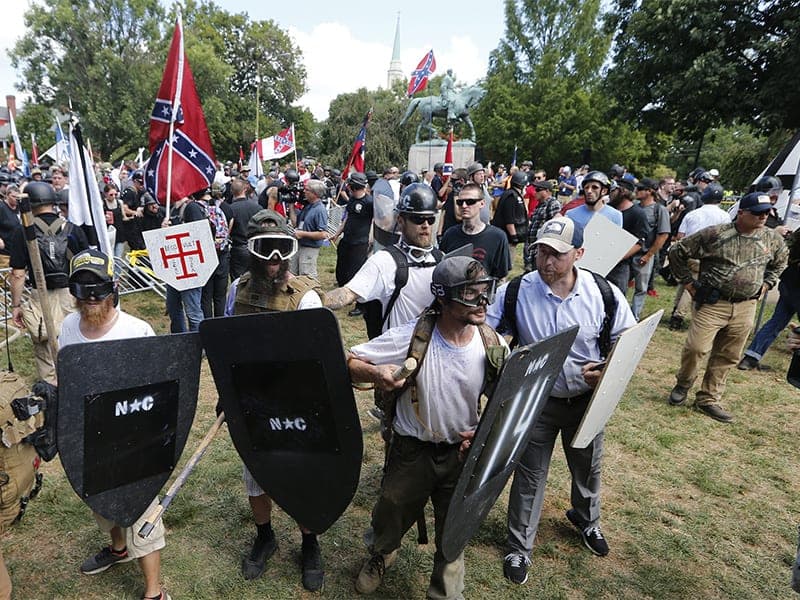There were no burning crosses or other hijacked symbols of religion on obvious display when white nationalists descended on Charlottesville, Virginia, earlier this month chanting “blood and soil,” a slogan dug up from the dredges of Nazism.
But Damon T. Berry, an assistant professor of religious studies at St. Lawrence University in Canton, N.Y., says the links between white nationalists and religion — especially Christianity — were there.
In his new book, “Blood & Faith: Christianity in American White Nationalism,” Berry traces how white nationalists — who believe whites are superior to other races and promote a whites-only vision of America — have cherry-picked Scripture to craft their exclusive ideology. He spoke about the book and the rise of Christian white supremacists with Religion News Service.
This interview has been edited for length and clarity.
RNS: Let’s start off by defining white nationalists. How are they different from white supremacists, neo-Nazis or the “alt-right”?
Berry: This is where it gets fuzzy. The internal distinctions can be quite complicated and for outsiders they tend to bleed together. I distinguish white nationalists as those oriented to an ideology I call “racial protection.” Their major focus is on the protection of the white race against what they see as a coming genocide and on the preservation of a “white homeland.” Those in the alt-right are very often also white nationalists, so white nationalist is a big-tent term.
How many white nationalists have links to religion? And is that religion always Christianity?
Based on my research, I would say it is the majority of them. The majority of white nationalists have, in some sense, engaged in an ideology called “Christian identity” — a racist interpretation of Christianity. It is the idea that race is more than biological or cultural, but also has a spiritual significance.
But as some sociologists have recognized, the dominance of Christian identity has diminished.What religion white nationalists engage with depends on what groups you are talking about. The Ku Klux Klan and the Aryan Nations are very firmly founded in Christianity.
They use the Bible to teach that the Jews derive from Cain, himself the product of a sexual liaison between Eve and the Serpent in Eden, and so are biologically evil, and that the beasts of the field were nonwhites created to do manual labor. And they use various stories from the Bible, like the Tower of Babel, as scriptural evidence that God wants racial segregation.
There are also white nationalist Mormons and there are Odinists who revive and revise the old Norse religion to uphold the idea of the superiority of whites.
You mention in the book there are also anti-religious white nationalists. What is that about?
There are some white nationalist groups that specifically speak out against religion, especially Christianity, as being harmful to the white race. Each of these groups articulates that position differently. Revilo Oliver, one of the formative ideologues of modern white nationalism, was deeply atheist in his views, as is Tom Metzger of White Aryan Resistance.
William Pierce, the founder of the National Alliance (a white nationalist group), felt Christianity was an alien ideology and he wanted to promote “cosmotheism” — the idea that the races are “evolving” and the white race will eventually become like gods.
Ben Klassen, founder of the Church of the Creator, was doing the same. He determined his ideology — called “Creativity,” a pantheistic religion with the white race at the center — should be the white man’s religion. And Richard Spencer (president of the National Policy Institute, a white nationalist think tank) is anti-religious. But it is difficult to give a straight answer to what anti-religious white nationalists believe because what I see is a very fluid, changing dynamic.
What did you see in Charlottesville and in other recent white nationalist gatherings? Were religious-based white nationalists and anti-religious white nationalists there?

What I am seeing is an explicit turn to the political. I would say the groups who have a religious vision and the ones who are anti-religion are trying very hard not to bring up anything that would be too divisive, and one of those things would be Christianity. In Charlottesville, the KKK and the Odinists were there, but nobody chanted “Jesus is our white savior” or “all religions will lead to race suicide” — which are things they say to each other all the time. But now they are saying their race is their religion and anything else — including Christianity — is negotiable.
What can people of faith who reject white nationalist ideology do to push back against these groups?
Most people seem to be appropriately horrified with what happened in Charlottesville, but this is an ongoing battle. Religious people of color have long dealt with this. The United Methodist Church and the Southern Baptist Convention (and many other Christian denominations) have had to deal with a legacy of racism in their ranks.
I think from my personal perspective, white Christians are going to have to fight a lot harder to deal with the pain of these legacies and quit denying that pain exists. It is a terrible legacy all white people have a responsibility to reverse. And I think we are taking some positive steps, but we need to do more about systemic racism. We have to “give till it hurts,” so to speak, because people of color have been hurting a long time while we have reaped the rewards. When it comes to dealing with the history of white supremacy, if it is not hard, it is not enough.












